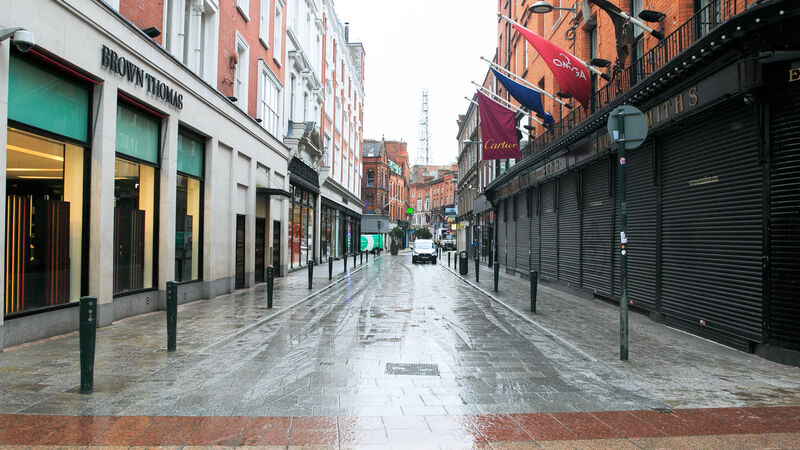Covid-19 restrictions will extend to June, warns Tánaiste

Grafton Street, Dublin. Hairdressers, beauticians, and other businesses will return 'way later' than March 5, said Mr Varadkar. Picture: Gareth Chaney/Collins
Enhanced restrictions on personal freedoms will extend into June, far beyond the March 5 review date previously announced by the Government, the Tánaiste has warned.
Leo Varadkar also said restrictions on non-essential travel are likely to remain in place “for the rest of the year and into next year”.
A return to special schools will begin tomorrow and a phased return of other children to the classroom is expected to commence by March. However, Mr Varadkar made it clear that while school reopenings will start early, there is no chance of construction restarting before the March 5 deadline.
Other sectors, including hairdressers and beauticians, will return “way later” than that, said Mr Varadkar.
The Tánaiste also confirmed that a revised version of the Living with Covid-19 plan is in the works, with Cabinet expected to agree the new plan by February 22.
He was speaking as a further 68 deaths from Covid-19 were confirmed, as well as a further 556 cases of the virus.
Mr Varadkar said he was “quietly confident” that with Covid-19 case numbers reducing that inter-county travel will be permitted to allow a “domestic summer season” to happen, which will see hospitality reopen.
However, in a far more pessimistic outlook, Professor Sam McConkey, infectious disease specialist at RCSI University of Medicine and Health Sciences, said the pandemic could go on for "three to five years" and that vaccines alone will not stop the problem. Speaking on Today FM, he said political leaders have “oversold” the beneficial impact of vaccines and it was a “false hope” that their rollout would bring everything back to 2019.
On foreign travel, the Tánaiste said: “The very strong advice from Government has been to avoid non-essential travel abroad. That advice will most likely stay in place for the duration of the year, if not into next year."
Despite warnings to not travel, Mr Varadkar criticised new penalties imposed elsewhere as "more authoritarian" than what would be acceptable in Ireland. He was referring to a new UK plan to impose 10-year prison sentences for falsely filling out passenger information forms. Britain is to introduce tighter border controls next week in a bid to stop new variants of the coronavirus, including a requirement for hotel quarantine for arrivals from high-risk countries.
On the Government’s plans here, Mr Varadkar said legislation on mandatory quarantining will be readied for passage through the Dáil and Seanad next week.
At Cabinet, Education Minister Norma Foley gave a “brief update” in relation to the Leaving Cert exams, with a “substantive decision” by the Government expected next week.
The comments came in the wake of a sitting of the Oireachtas Health Committee, which was told of mounting staff absences and soaring waiting lists.
After the committee, Michelle Kingston, an Irish Nurses and Midwives Organisation representative, told the that mounting pressures will force many out of the sector once the pandemic ends. Staff are exhausted to the point of breaking, she warned.
"There is so much on at the hospital, then you go home and have to switch to being a teacher,” said Ms Kingston.
“I would think some of them will retire early, without a shadow of a doubt, when this is over."
Meanwhile, the Minister for Finance Paschal Donohoe said the current VAT reduction will not be extended when it runs out at the end of this month.
The rate, which was reduced from 23 per cent to 21 per cent last year as part of the Government’s July stimulus package, was designed to help retailers who had seen profits slump due to the pandemic.
“It is our attention that the VAT rate will go back up to its original rate at the end of the planned period,” Mr Donohoe told the Oireachtas Committee on Budgetary Oversight.
“When we made the original decision in relation to the standard rate of VAT, there was a particular need to support retailers at a time of great difficulty.
“We've now launched the series of support schemes that are providing additional support to that part of our economy.” According to the Department of Finance, the temporary reduction in the VAT rate applied to about 50 per cent of transactions, including item such as alcohol, tobacco, clothes, electrical equipment and fuel.
The increase will see an extra €2 in tax on every €100 spent on goods and services in the State that attract the standard rate of VAT.
Mr Donohoe added the separate reduced rate of 9 per cent for the hospitality sector would continue until the end of 2021.












